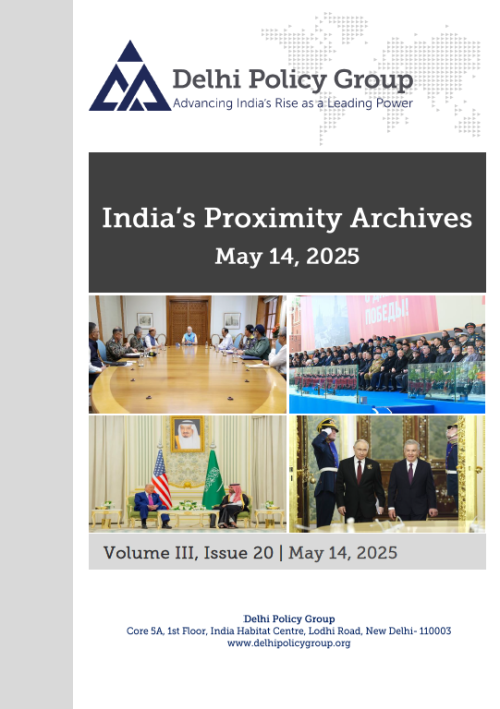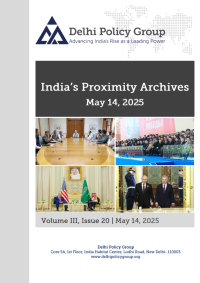India’s Proximity Archives
Date: May 14, 2025
South Asia
Following the April 22nd terrorist attack in Pahalgam, perpetrated by the Pakistan-based Lashkar-e-Taiba, the Indian Armed Forces initiated Operation Sindoor on May 6. The operation resulted in the destruction of substantial India-centric terrorist infrastructure located in Pakistan. Subsequently, India issued a statement disavowing further escalation, asserting that its initial objectives had been met; however, on the night of May 7-8, Pakistan, in a provocative escalation, launched drone and missile attacks against multiple civil and military installations in northern and western India. India’s air defense systems successfully repelled these attacks.
Following the April 22nd terrorist attack in Pahalgam, perpetrated by the Pakistan-based Lashkar-e-Taiba, the Indian Armed Forces initiated Operation Sindoor on May 6. The operation resulted in the destruction of substantial India-centric terrorist infrastructure located in Pakistan. Subsequently, India issued a statement disavowing further escalation, asserting that its initial objectives had been met; however, on the night of May 7-8, Pakistan, in a provocative escalation, launched drone and missile attacks against multiple civil and military installations in northern and western India. India’s air defense systems successfully repelled these attacks.
Southeast Asia
Former Philippine President Rodrigo Duterte, detained at the International Criminal Court (ICC), won the mayoral election in his home Davao City, while five candidates backed by his family are leading the Senate race showing the Duterte political dynasty’s continued grip on power. The results are a big boost for Vice President Sara Duterte, Rodrigo Duterte’s daughter, who faces impeachment by the Senate in July 2025. The Philippine mid-term elections have thrown up unexpected results that may shake President Ferdinand "Bongbong" Marcos Jr's hold on the senate.
Former Philippine President Rodrigo Duterte, detained at the International Criminal Court (ICC), won the mayoral election in his home Davao City, while five candidates backed by his family are leading the Senate race showing the Duterte political dynasty’s continued grip on power. The results are a big boost for Vice President Sara Duterte, Rodrigo Duterte’s daughter, who faces impeachment by the Senate in July 2025. The Philippine mid-term elections have thrown up unexpected results that may shake President Ferdinand "Bongbong" Marcos Jr's hold on the senate.
East Asia
During Xi Jinping's state visit to Russia for the 80th anniversary of the Soviet Union’s Victory in the Great Patriotic War, China and Russia issued a joint statement on May 9, emphasising their strong strategic alignment. The statement stressed the need for collective security, multilateralism, and also called out Western-led military alliances like NATO and AUKUS, accusing them of undermining global stability through nuclear doctrines or schemes such as “nuclear sharing” and “extended nuclear deterrence” and militarisation of emerging technologies like space and AI. The two countries reaffirmed support for the Non-Proliferation Treaty (NPT), the Biological Weapons Convention (BTWC), and a legally binding treaty to prevent space weaponisation, while expressing serious concern about the U.S. and its allies violating arms control norms under various international conventions and conducting military biological activities. The statement shows a clear intention of China and Russia to actively cooperate in addressing critical challenges within the international security framework and promote a more balanced arms control architecture to maintain and strengthen global strategic stability.
During Xi Jinping's state visit to Russia for the 80th anniversary of the Soviet Union’s Victory in the Great Patriotic War, China and Russia issued a joint statement on May 9, emphasising their strong strategic alignment. The statement stressed the need for collective security, multilateralism, and also called out Western-led military alliances like NATO and AUKUS, accusing them of undermining global stability through nuclear doctrines or schemes such as “nuclear sharing” and “extended nuclear deterrence” and militarisation of emerging technologies like space and AI. The two countries reaffirmed support for the Non-Proliferation Treaty (NPT), the Biological Weapons Convention (BTWC), and a legally binding treaty to prevent space weaponisation, while expressing serious concern about the U.S. and its allies violating arms control norms under various international conventions and conducting military biological activities. The statement shows a clear intention of China and Russia to actively cooperate in addressing critical challenges within the international security framework and promote a more balanced arms control architecture to maintain and strengthen global strategic stability.
West Asia
US President Donald Trump met Saudi Arabia's Crown Prince and Prime Minister Mohammed bin Salman in Riyadh during his visit to the Middle East on May 13. Both leaders pledged to strengthen the US-Saudi strategic partnership for economic prosperity, with Riyadh committing USD 600 billion in investment in the US in areas such as energy security, defence industry, high technology, and access to global infrastructure and critical minerals. The US and Saudi Arabia also reached an agreement on a USD 142 billion arms package, which the US described as its largest “defence cooperation agreement” to date. President Trump announced that the US would lift sanctions on Syria in response to a request from Saudi Arabia's Crown Prince and Prime Minister Mohammed bin Salman.
US President Donald Trump met Saudi Arabia's Crown Prince and Prime Minister Mohammed bin Salman in Riyadh during his visit to the Middle East on May 13. Both leaders pledged to strengthen the US-Saudi strategic partnership for economic prosperity, with Riyadh committing USD 600 billion in investment in the US in areas such as energy security, defence industry, high technology, and access to global infrastructure and critical minerals. The US and Saudi Arabia also reached an agreement on a USD 142 billion arms package, which the US described as its largest “defence cooperation agreement” to date. President Trump announced that the US would lift sanctions on Syria in response to a request from Saudi Arabia's Crown Prince and Prime Minister Mohammed bin Salman.
Central Asia
On May 9, Russian President Vladimir Putin met with President of the Republic of Uzbekistan Shavkat Mirziyoyev, who was taking part in celebrations marking the 80th anniversary of Victory in the Great Patriotic War. The leaders discussed methods for expanding and strengthening of Uzbek-Russian relations of comprehensive strategic partnership and alliance in the context of practical implementation of agreements reached during the visit of Russia’s President to Uzbekistan in May last year. Additionally, they discussed way to take coordinated measures to maintain the dynamic of trade, economic and investment cooperation. Special attention was paid to accelerating preparation and implementation of projects in priority economic sectors, and encouraging cooperation ties between the regions.
On May 9, Russian President Vladimir Putin met with President of the Republic of Uzbekistan Shavkat Mirziyoyev, who was taking part in celebrations marking the 80th anniversary of Victory in the Great Patriotic War. The leaders discussed methods for expanding and strengthening of Uzbek-Russian relations of comprehensive strategic partnership and alliance in the context of practical implementation of agreements reached during the visit of Russia’s President to Uzbekistan in May last year. Additionally, they discussed way to take coordinated measures to maintain the dynamic of trade, economic and investment cooperation. Special attention was paid to accelerating preparation and implementation of projects in priority economic sectors, and encouraging cooperation ties between the regions.
Indian Ocean Region
In the wake of the Pakistan-sponsored terror attack in Pahalgam on April 22, 2025, the Indian Navy under ‘Operation Sindoor’, deployed its advanced anti-missile and anti-aircraft defence capabilities as a part of a joint operational plan coordinated with the Indian Army and Air Force, aimed at deterring further hostilities and maintaining escalation control. Central to this operation was the deployment of the Carrier Battle Group (CBG), supported by numerous MiG-29K fighters and Airborne Early Warning helicopters, which formed the first layer of the Navy’s layered Fleet Air Defence system. This robust forward-deployed posture ensured that no suspicious or hostile aircraft could approach within several hundred kilometres of the fleet, maintaining an uncontested operational presence that effectively denied Pakistan any opportunity to threaten India’s maritime interests. At a joint briefing with senior commanders from the armed forces, the Director General of Naval Operations, Vice Admiral A.N. Pramod, highlighted that the Navy’s deployment in the Arabian Sea compelled the Pakistan Navy to remain confined to its harbours or operate only close to its coastline, underscoring India’s decisive maritime dominance during the operation.
In the wake of the Pakistan-sponsored terror attack in Pahalgam on April 22, 2025, the Indian Navy under ‘Operation Sindoor’, deployed its advanced anti-missile and anti-aircraft defence capabilities as a part of a joint operational plan coordinated with the Indian Army and Air Force, aimed at deterring further hostilities and maintaining escalation control. Central to this operation was the deployment of the Carrier Battle Group (CBG), supported by numerous MiG-29K fighters and Airborne Early Warning helicopters, which formed the first layer of the Navy’s layered Fleet Air Defence system. This robust forward-deployed posture ensured that no suspicious or hostile aircraft could approach within several hundred kilometres of the fleet, maintaining an uncontested operational presence that effectively denied Pakistan any opportunity to threaten India’s maritime interests. At a joint briefing with senior commanders from the armed forces, the Director General of Naval Operations, Vice Admiral A.N. Pramod, highlighted that the Navy’s deployment in the Arabian Sea compelled the Pakistan Navy to remain confined to its harbours or operate only close to its coastline, underscoring India’s decisive maritime dominance during the operation.



